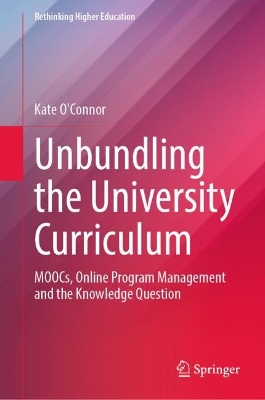Rethinking Higher Education
1 total work
In a context in which explicit attention to the curriculum has been sidelined in universities’ strategy, this book makes an argument for why curriculum matters, both in understanding the effects of unbundled online learning and more broadly. It takes up two particular curriculum issues which are amplified in an unbundled context: differences in the formulation of curriculum between disciplines and professional fields, and the extent these are recognised in university strategy; and the push for constructivist pedagogies, and its effects on curriculum construction.
Since the onslaught of MOOCs in 2012, unbundled forms of online learning offered via partnerships with external online program management and MOOC providers have grown significantly across the university sector. There has been much debate about the implications of these partnerships but the focus has predominantly been on the engagement of students and their learning. This book takes a different and novel approach, looking instead at the effects on curriculum and knowledge.
Drawing on selected case studies, the book reflects on how university leaders and academics engaged with MOOCs and other forms of unbundled online learning in the early 2010s, and the effects of these reforms on curriculum practice. It captures in detail the complex and difficult work involved in university curriculum making in a way rarely seen in discussions of higher education. And it generates new in-sights about some of the critical problems manifest in the ongoing moves to embrace unbundled online learning today.
Since the onslaught of MOOCs in 2012, unbundled forms of online learning offered via partnerships with external online program management and MOOC providers have grown significantly across the university sector. There has been much debate about the implications of these partnerships but the focus has predominantly been on the engagement of students and their learning. This book takes a different and novel approach, looking instead at the effects on curriculum and knowledge.
Drawing on selected case studies, the book reflects on how university leaders and academics engaged with MOOCs and other forms of unbundled online learning in the early 2010s, and the effects of these reforms on curriculum practice. It captures in detail the complex and difficult work involved in university curriculum making in a way rarely seen in discussions of higher education. And it generates new in-sights about some of the critical problems manifest in the ongoing moves to embrace unbundled online learning today.
